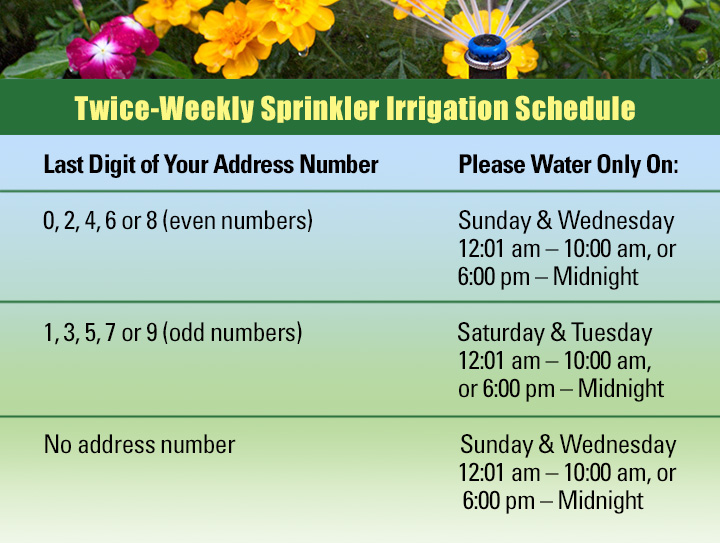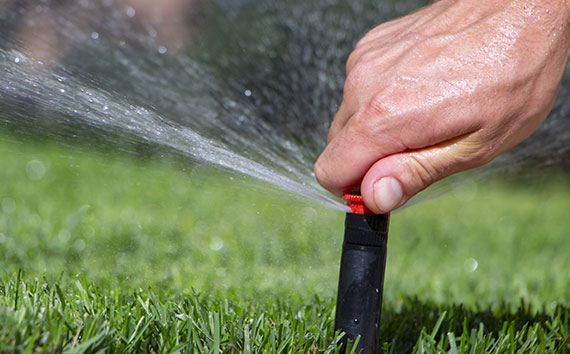Connecticut Watering Schedule
Smarter watering starts with you
People across the country are putting water high on the list of things to use more efficiently, especially given the large fluctuations in the amount of rain and snow we receive. In addition, of course, to the finite nature of the water supply and the essential role of the water supply It contributes to human, economic and environmental well-being.
In the communities shown below, residents are saving millions of gallons of water each year by following a mandatory schedule for sprinkler irrigation.
Customers in Darien, East Granby, Easton, Fairfield, Granby, Greenwich, Groton, Mystic, New Canaan, Ridgefield, Simsbury, Stamford, Stonington, Trumbull, Weston, Westport and Wilton must follow the twice-weekly watering schedule from April 1 through October 31.
Drip irrigation, soaker hoses, and hand watering are allowed at any time. Some residential and commercial customers may qualify for a schedule variation.

Report a watering violation
In coordination with state and local officials, water restrictions have been issued for towns in Connecticut and Massachusetts. These restrictions are designed to protect the health and safety of our communities; ensure towns have an adequate water supply for everyday needs; and to give water sources time to recover.
Water conservation is everyone’s responsibility. Should you notice a resident or business that appears to be in violation of the mandatory irrigation restrictions, you can report the issue by filling out our Anonymous Watering Violation Form.

Connecticut Towns Included in Aquarion's Mandatory Watering Program
For customers in Darien, East Granby, Easton, Fairfield, Granby, Greenwich, Groton, Mystic, New Canaan, Ridgefield, Simsbury, Stamford, Stonington, Trumbull, Weston, Westport and Wilton. The watering schedule is in effect from April 1 to October 31.
| Last digit of your address number | Please water only in: |
| 0, 2, 4, 6 or 8 (even numbers) | Sunday & Wednesday |
| 1, 3, 5, 7 or 9 (odd numbers) | Saturday & Tuesday |
| No address number | Sunday & Wednesday |
Frequently Asked Questions (FAQs)
There are no limits on washing cars and boats. But we do ask that you avoid wasting water by:
- Letting run-off water soak into the ground, and not onto pavement or into storm drains
- Washing in the early morning to lessen water evaporation and the quantity you’ll need
- Using an automatic shutoff nozzle on your hose to minimize waste
There are exceptions. These uses are automatically exempt from the schedule and don’t require a irrigation variance. They include:
- Watering with drip irrigation, soaker hoses or hand-watering
- Using water from a non-Aquarion source (though state and local regulations may not permit this)
- Irrigating during the repair or testing of an automatic irrigation system
- Irrigating commercial nursery stock.
If your system is properly set to the schedule, it shouldn’t matter if you’re home or away. We will notify customers who seem to be irrigating outside of their scheduled times. This provides multiple opportunities to conform with the mandatory limits. All the major irrigation companies in the area are aware of the schedule and know how to program systems to follow it.
If you leave someone in charge of your home while you are away, please let them know how to contact your irrigation company should the system stop working properly, including if the power goes out.
Experts in horticulture have found that landscapes are healthiest with deep and infrequent watering. Even in the heat of summer, landscapes can thrive on only about one inch of water every five to ten days.
Over-watering not only wastes water, it discourages healthy root growth, making plants more susceptible to damage from extreme heat, freezing temperatures, pests, diseases, and droughts. Native or adapted plants require less water. In fact, some perennial flowers can go weeks without supplemental watering.
Often a plant suffering only from temporary heat stress will look like it needs more water when it doesn’t. If a plant droops in the afternoon, check on it early the next morning. If it looks good, the plant is likely just reacting to heat. Watering won’t be necessary.
Check the soil, too. The surface may look dry, but a few inches below it may feel damp, showing that it has ample water. Checking soil moisture levels frequently will help you prevent needlessly drowning your landscape. You can also conserve soil moisture by laying down three to four inches of mulch around plantings.
Yes. The State of Connecticut, through the Public Utilities Regulatory Authority, gives Aquarion the right to “restrict the use of water by any Customer or class of Customers when in the Company’s judgment such restriction is in the public interest.”*
With clean, high-quality water so vital to people everywhere, regulating its use is clearly in the public interest. As the U.S. Environmental Protection Agency (EPA) notes, “The U.S. population has doubled over the past 50 years, while our thirst for water has tripled. With at least 40 states anticipating water shortages by 2024, the need to conserve water is critical…."
*Rules and Regulations. Aquarion Water Company. Section x – Water Conservation, Item 2
To renew your irrigation variance, submit a Large Property or High-Efficiency variance application, and indicate that you are requesting a renewal in the Explanation for Variance Request field.
Upon submission, you will receive an email confirmation and your request will be reviewed. If the property has met the consumption savings target, your variance will be approved without a site-assessment requirement. In the 4th year, a variance property would require a site re-assessment with the property’s irrigation contractor, as irrigation systems change over time.
For details about the variance applications, please visit our CT Irrigation Variance Programs page.
In order to be considered for an irrigation variance renewal, a property must have:
- Applied for a variance each sequential year by submitting a variance application
- An irrigation system maintained by a licensed irrigation contractor
- Consistently met water savings target of that particular variance requirement:
- If the property has met the savings target, the property will be approved for a variance with no site assessment and a new permit for the season will be emailed to the applicant. At the 4th year, a variance property would require a site re-assessment with the property’s licensed irrigation contractor, as systems change over time.
- If the property did not meet the savings target, the property situation will be reviewed and a site re-assessment will be requested with the property’s irrigation contractor to understand why it did not meet the savings target (e.g. an undetected leak).
For details about the variance applications, please visit our CT Irrigation Variance Programs page.
Tips for watering your lawn and garden
Landscapes can thrive with water twice a week or even less.
Learn More